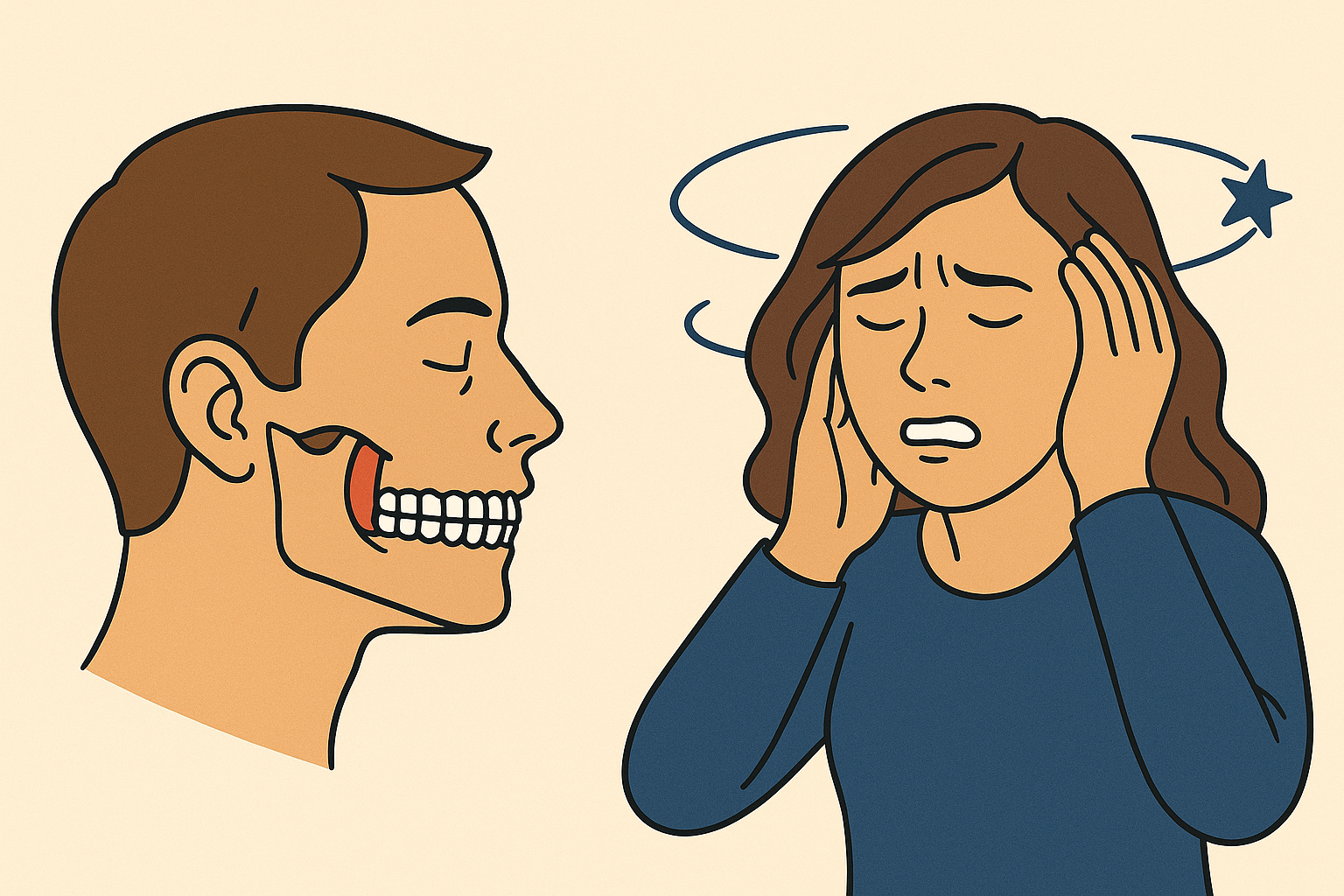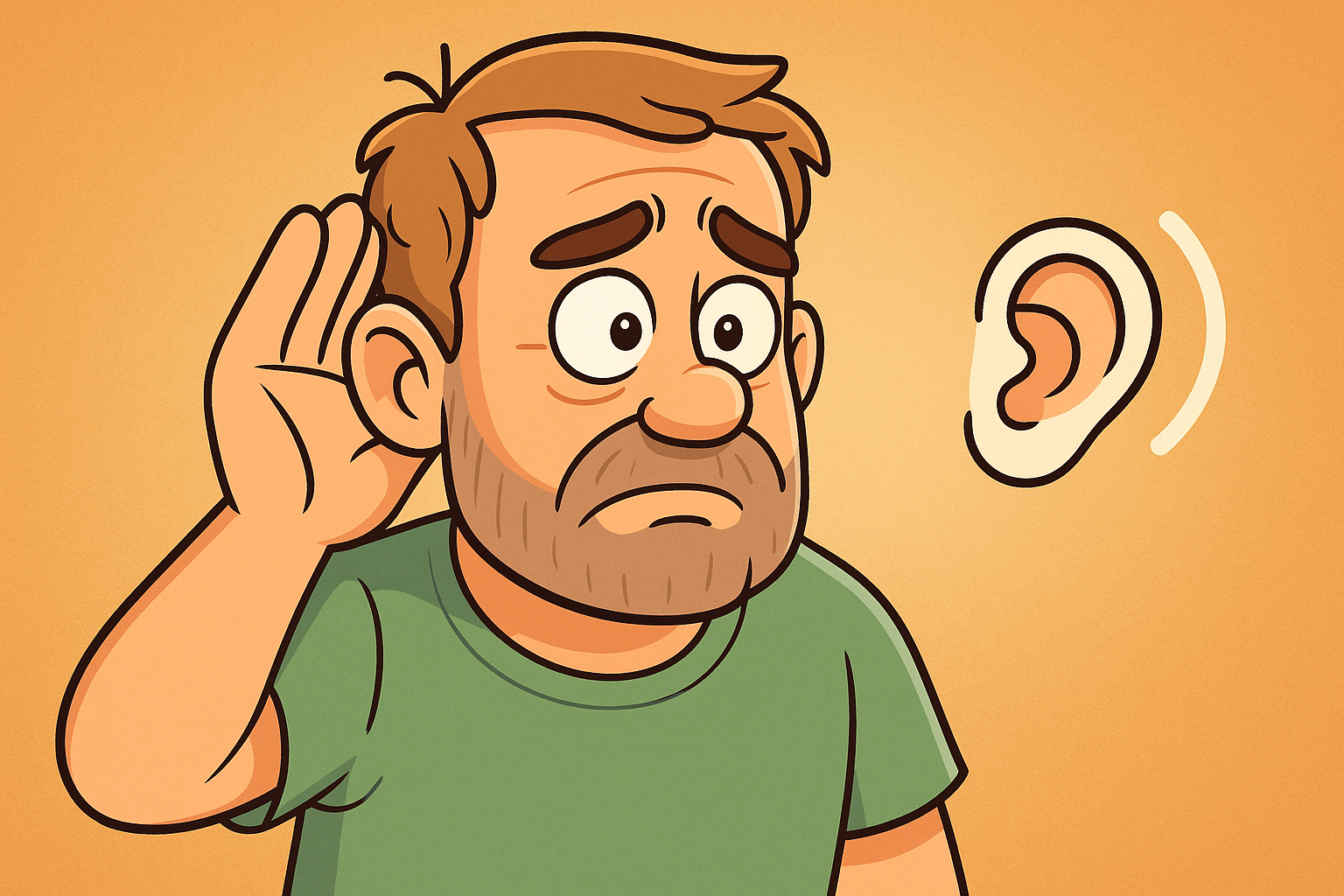Feeling dizzy for no clear reason can be unsettling. While most people assume vertigo is caused by inner ear problems or low blood pressure, there’s another possible culprit that often goes unnoticed: your jaw. Yes, that hinge you use to chew and talk could actually be affecting your sense of balance. In this article, we’ll explore how jaw problems, specifically TMJ disorders, might be linked to vertigo and what you can do about it.
What Is Vertigo?
Vertigo is the sensation that you or your surroundings are spinning, even when you’re standing still. It’s not just dizziness; it’s a disorienting feeling that can interfere with daily activities. People often describe it as a swaying, tilting, or spinning sensation. In some cases, it can be accompanied by nausea, headaches, or difficulty standing.
Vertigo isn’t a disease itself, but a symptom of an underlying issue. These issues are usually related to the inner ear or brain, but increasingly, experts are discovering links between vertigo and other conditions—including jaw problems.
What Are Jaw Problems?
Jaw problems often refer to disorders of the temporomandibular joint, or TMJ. This joint connects your jawbone to your skull and plays a crucial role in talking, chewing, and even breathing. TMJ disorders can result from various causes like teeth grinding (bruxism), jaw misalignment, arthritis, or even stress.
Common symptoms of jaw problems include:
- Clicking or popping sounds when moving the jaw
- Pain or tenderness in the jaw or around the ear
- Difficulty chewing or opening the mouth wide
- Headaches or facial pain
Many people live with these symptoms without realizing that their jaw might also be affecting their balance.
Can Jaw Problems Cause Vertigo?
Yes, jaw problems can cause vertigo. The link might seem surprising, but it’s supported by anatomical connections between the jaw, ear, and brain. TMJ disorders can affect the nerves and muscles around the jaw, which are closely related to those responsible for balance.
For instance, the trigeminal nerve, which serves the jaw, also connects with areas that influence equilibrium. Inflammation or pressure in this region can disturb signals sent to your brain, leading to a sensation of dizziness or spinning. So, while jaw problems may not be the most common cause of vertigo, they are a legitimate and often overlooked contributor.
The TMJ–Inner Ear Connection
The temporomandibular joint is located just in front of the ears, very close to the structures of the inner ear—the primary system responsible for balance. When the jaw is misaligned or inflamed, it can put pressure on the ear canal or affect the vestibular system.
Key points about the TMJ-Inner Ear connection:
- Shared nerve pathways: Trigeminal and vestibulocochlear nerves are interconnected
- Close anatomical proximity: Swelling or misalignment can affect inner ear function
- Muscle tension: Stress in the jaw muscles can radiate to the neck and skull, further impacting balance
This explains why TMJ disorders may lead to unexplained dizziness or vertigo.
Real-Life Symptoms of TMJ-Induced Vertigo
TMJ-related vertigo can present differently from vertigo caused by inner ear infections or other medical conditions. If your dizziness is accompanied by jaw discomfort, there’s a strong chance the two are related.
Look out for these symptoms:
- Dizziness when chewing, talking, or yawning
- A clicking or popping jaw followed by disorientation
- Ear pain without infection
- Headaches centered around the temples
The combination of jaw symptoms and vertigo is a red flag worth discussing with your healthcare provider.
Who Is Most at Risk?
While TMJ disorders can affect anyone, certain individuals are more prone to developing jaw-related vertigo. Knowing your risk can help you take preventive steps.
Groups most at risk include:
- People who grind or clench their teeth (bruxism)
- Individuals under high stress, leading to jaw tension
- Athletes or those with facial trauma
- Women aged 20 to 40, as they are statistically more likely to experience TMJ disorders
Understanding your risk factors is the first step toward identifying and managing the condition.
Diagnosis: How Do You Know Your Vertigo Is Jaw-Related?
Diagnosing TMJ-related vertigo requires a detailed evaluation since its symptoms often overlap with other disorders. The key is to notice when the symptoms appear and if they correlate with jaw movement or pain.
What to expect during diagnosis:
- Physical examination of your jaw
- Imaging tests like X-rays or MRI
- Vestibular testing if balance issues are significant
- Dental evaluations for bite alignment and grinding
Tip: Keep a journal of your symptoms and note any patterns related to jaw use or stress.
Treatment Options for TMJ-Related Vertigo
Thankfully, TMJ-induced vertigo is treatable, especially when diagnosed early. Treatment focuses on relieving jaw tension and reducing inflammation.
Treatment options include:
- Self-care: Resting the jaw, applying warm compresses, avoiding hard foods
- Medications: Anti-inflammatory drugs or muscle relaxants
- Dental devices: Mouth guards to prevent teeth grinding
- Therapies: Physical therapy or chiropractic care
- Injections: Botox for chronic tension
- Surgery: Reserved for severe, persistent cases
The goal is to restore jaw function and reduce stress on nearby nerves and structures.
Home Remedies & Lifestyle Tips
In many cases, simple lifestyle changes can significantly reduce TMJ-related symptoms, including vertigo. These tips are safe, effective, and easy to implement at home.
Try these remedies:
- Avoid gum and chewy foods
- Practice stress-reducing activities like yoga or meditation
- Maintain good posture, especially when using screens
- Use a supportive pillow to avoid neck tension during sleep
- Apply warm compresses to the jaw muscles daily
Consistency is key to noticing long-term improvement.
When to See a Specialist
Sometimes, symptoms persist despite home care. In such cases, it’s essential to seek help from the right professional.
Consider visiting a:
- Dentist for jaw alignment and bite issues
- ENT specialist if you suspect inner ear involvement
- Neurologist for more complex dizziness and nerve-related issues
Seeking help early can prevent chronic issues and reduce the risk of further complications.
Prevention: How to Protect Your Jaw & Balance
Preventive care is the best way to avoid the discomfort and disruption of TMJ-related vertigo. Building small habits into your routine can help you stay symptom-free.
Here’s what you can do:
- Schedule regular dental checkups
- Avoid opening your mouth too wide when yawning
- Wear a mouthguard if you grind your teeth
- Address stress proactively with therapy or relaxation techniques
- Monitor your posture during long work sessions
These practices support both your jaw health and your overall sense of balance.
Conclusion
The connection between jaw problems and vertigo may not be obvious, but it’s very real. If you’re dealing with unexplained dizziness, it might be time to look beyond your ears and consider your jaw. With the right diagnosis and treatment plan, you can regain control of your balance and feel like yourself again. Don’t ignore the signs—your jaw might be trying to tell you something important.
FAQs
Can jaw problems really cause vertigo or is it a myth?
It’s not a myth. TMJ disorders have been linked to vertigo through nerve connections and anatomical proximity to the inner ear.
How long does TMJ vertigo last?
It varies. Some people find relief in weeks with treatment, while others may take longer depending on severity.
Can a mouthguard help with vertigo?
Yes, especially if your vertigo is related to nighttime teeth grinding or jaw misalignment.
Should I see a dentist or ENT first?
Start with a dentist if you have jaw pain. If no dental cause is found, an ENT can rule out ear-related issues.
Are there exercises to relieve TMJ symptoms?
Gentle jaw stretches and posture corrections can help reduce pressure and support balance.









